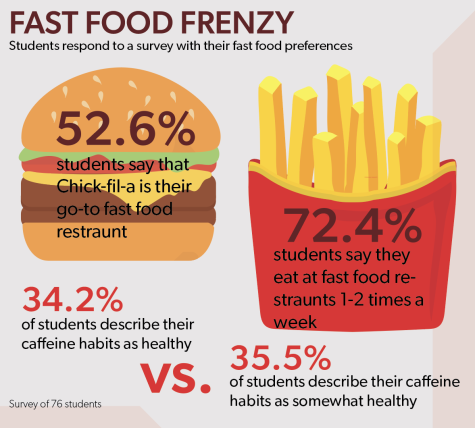Fast Food Fixation
March 20, 2023
Finding time to prepare, cook and eat a meal is especially difficult for some teenagers, many of whom turn to fast food runs for the sake of convenience amidst their busy schedules. With packed agendas, speed and convenience can take precedence over healthy food choices, despite the dietary risks of frequent fast food meals.
According to a JagWire survey, 87.9% of students who responded eat fast food at least once a week. After school activities can frequently crowd evening schedules making it difficult to maintain healthy eating habits. This is the case for students like Cowen.
“Every Monday I go to McDonald’s after scouts,” Cowen said. “And then on most Wednesdays and Thursdays I have play practice followed by robotics. So I just go [to McDonalds] on the way”
Despite their fast food eating routines, many students, like sophomore Zacheus Chesser, who finds himself at McDonald’s more than once a week after school, are aware of the negative costs of eating fast food regularly during their week.
“It’s a lot of money that I spend instead of cooking something,” Chesser said. “But I usually try to eat dinner at home-something healthier.”

Once more, teenage schedules prove to be the bane of a healthy, home cooked meal. While most parents may disapprove of these habits, students like Chesser have found that their opinions on the matter are minimal.
“[My parents] don’t like it too much,” Chesser said. “But sometimes I pick stuff up for them so they’re not too mad about it.”
Cowen has had similar experiences with his parents and their opinions on his eating habits in addition to the reactions of his friends.
“My dad doesn’t approve too much,” Cowen said. “My mom doesn’t seem to care and most of my friends just think it’s funny.”
While medical recommendations, financial considerations and peer opinion are all factors that play into habitually eating fast food, ultimately these dietary decisions are made by the individual. According to Chesser, dietary decisions can and should be made based on the individual and their lifestyle, as they depend on fitness, finances and reasoning for the habit.
“I think if you can afford it and if you work it off, it’s pretty good,” Chesser said. “But if you just do it just to eat fast food, it’s not good for you.”
Despite the low nutritional value of fast food, Chesser finds himself eating fast food not only for the speed, but also for the price.
“I know it’s a pretty bad habit,” Chesser said. “But it’s also really convenient, so I do it a lot and it’s pretty cheap: probably like 40 bucks a week, so not that much”
Frequenting the drive-thru not only has financial costs, but physical costs as well. According to Lauer, the significance of a healthy diet outweighs the convenience of a fast food meal.
“Without a healthy diet balanced with a healthy exercise regimen, it is very challenging to stay healthy and be able to do all the things we want to in life,” Lauer said. “So it’s important for everyone, adolescents included, to understand the health benefits of a healthy diet.”